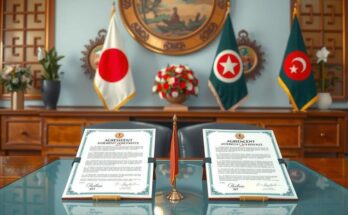In a recent discussion, Lebanese Foreign Minister Abdallah BouHabib articulated the pressing challenges facing Lebanon amidst ongoing violence and instability. He criticized President Biden’s remarks at the UN for their lack of substance regarding Lebanon’s situation while emphasizing the urgent need for peace and a diplomatic approach to resolving conflicts with Israel. BouHabib underscored the significant desire among the Lebanese for peace, with 90% supporting this initiative, and called for greater involvement from the United States in mediating future resolutions.
In the latest episode of Carnegie Connects, Aaron David Miller conversed with Lebanese Foreign Minister Abdallah BouHabib regarding Lebanon’s ongoing crisis and potential responses from the United States and other nations. During the discussion, which took place shortly after President Biden’s address at the UN General Assembly, Minister BouHabib expressed disappointment with the President’s remarks on Lebanon, deeming them inadequate to address the country’s dire situation. The mood in Lebanon is described by BouHabib as profoundly depressing, exacerbated by recent escalations in violence. He articulated that Lebanese citizens, who have endured prolonged conflicts, yearn for stability and peace, with a noteworthy 90% supporting such a desire. Minister BouHabib emphasized that while there are factions that perceive Hezbollah in various lights—some viewing it as a legitimate resistance against Israeli occupation—many Lebanese do not support its military actions that endanger civilians. He also highlighted the necessity for the international community, particularly the United States, to engage in resolving Lebanon’s multifaceted crises, including the need to challenge Hezbollah’s armed presence through negotiations and peace agreements relating to border issues with Israel. BouHabib pointed out that the geopolitical landscape surrounding Lebanon is heavily influenced by external factors, notably the conflict in Gaza, further complicating matters. Despite the hardships, he remains hopeful that diplomatic channels remain a viable path to peace. Overarching themes of his analysis include the call for negotiations to address territorial disputes and the plea for American involvement in stabilizing the region. In conclusion, Minister BouHabib underscored that addressing Lebanon’s issues requires both local and international cooperation, with the aim of fostering peace rather than continuing cycles of violence. Ultimately, his remarks encapsulate the complexities facing Lebanon in striving for sovereignty, peace, and a brighter future free from conflict.
Lebanon continues to grapple with internal strife and external pressures, severely impacting its sovereignty and stability. The recent escalation of violence tied to the Israel-Hezbollah dynamics, compounded by the ongoing crisis in Gaza, exacerbates the challenges faced by the Lebanese government and its people. Amidst enduring economic difficulties and political instability, officials like Foreign Minister Abdallah BouHabib have been vocal about the urgent need for international assistance, particularly from the United States, which they view as pivotal in mediating peace and addressing Lebanon’s longstanding grievances. The rhetoric from Lebanese leaders also indicates a rising desire among the populace for peace, moving away from the tumult of past conflicts.
The conversation with Minister Abdallah BouHabib highlights a critical juncture for Lebanon. With a populace yearning for peace and a government seeking international assistance, the call for diplomatic engagement is more pressing than ever. The acknowledgment of Hezbollah’s complicated role within Lebanon reflects the intricate politics at play, while the increasing demand for sovereignty and stability emphasizes the necessity for constructive dialogue. As Lebanon seeks pathways to resolve its crises, the international community—especially the United States—holds a significant role in shaping the future of the region.
Original Source: carnegieendowment.org




